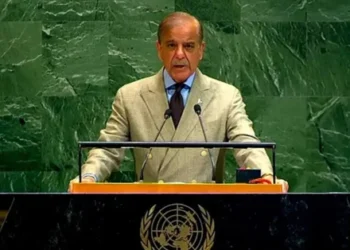The Supreme Court on Monday suspended an Islamabad High Court order that had restrained Justice Tariq Mehmood Jahangiri from judicial work over an alleged fake degree case.
A five-member constitutional bench headed by Justice Aminuddin Khan heard the case. The bench included Justice Jamal Khan Mandokhel, Justice Muhammad Ali Mazhar, Justice Hassan Azhar Rizvi and Justice Shahid Bilal Hassan.
Five judges of the Islamabad High Court, including Justice Tariq Jahangiri, reached the Supreme Court. Justice Mohsin Akhtar Kayani, Justice Babar Sattar, Justice Ijaz Ishaq, Justice Saman Riffat Imtiaz also reached the Supreme Court. All five judges of the Islamabad High Court entered the Supreme Court through the common people’s path.
On this occasion, Justice Tariq Mahmood Jahangiri was asked about the alleged fake degree.
The journalist asked if Karachi University had cancelled his degree. Will he go to court?
Justice Jahangiri replied that he had filed a petition in the Sindh High Court. It is surprising that they are cancelling the degree after 34 years. This has never happened in the history of the world.
During the hearing, Justice Jamal Khan Mandokhel remarked that we only have the case up to the extent of the interim order of the Islamabad High Court. A meeting of the Supreme Judicial Council has been called for October 18.
Justice Shahid Bilal said that the lawyers of both sides should prepare for this question.
There were objections to the petition against Justice Jahangiri in the Islamabad High Court. How was the writ petition numbered despite the objections of the Registrar’s Office?
Justice Jamal Khan Mandokhel said that the Supreme Court has already ruled that a judge cannot be stopped from judicial work.
Justice Tariq Jahangiri’s lawyer Munir A Malik took the position that Justice Jamal Khan’s recent decision means that a judge cannot issue a writ against a judge.
Justice Jamal Khan Mandokhel remarked that the facts of the case were different from the one you are referring to.
Munir A Malik took the position that for 16 months, no one showed sensitivity in this case against Justice Jahangiri, nor did anyone talk about the severity, a sudden order was given, while the complaint is pending in the Supreme Judicial Council, the judge is prevented from working, violating the Malik Asad Ali case, the judge was prevented from judicial work, a judge cannot be prevented from judicial matters through an interim order.
Munir A Malik argued that a unilateral decision cannot be made against a judge, recently Justice Jamal Mandokhel has said in a decision that a judge cannot issue a writ against a judge.
Justice Jamal Khan Mandokhel remarked that it is related to the personal conduct of the judge, you should read the entire decision.
Advocate Mian Dawood took the position that the Supreme Court had stopped Sajjad Ali Shah from judicial work, Justice Muhammad Ali Mazhar remarked that the order to stop Justice Sajjad Ali Shah from work was given on the application of Article 184/3, the facts of Justice Sajjad Ali Shah’s case are different from this case.
Munir A. Malik requested that the constitutional bench suspend the orders stopping Justice Tariq Jahangiri from work, if the order to stop work is not suspended, it will send a wrong signal, because the judge has also filed an application in the High Court.
Justice Jamal Khan Mandokhel remarked that the Supreme Court has already ruled that a judge cannot be stopped from judicial work.
At the end of the hearing, a consultation was held between Justice Aminuddin and Justice Jamal Khan Mandokhel. After the consultation of the judges, the Supreme Court suspended the order of the Islamabad High Court.
Member Islamabad Bar Council Aleem Abbasi said that we have also filed an application to become a party in this case. Justice Jamal Khan inquired whether you were a party in the Islamabad High Court. The main petitioner is Justice Tariq Jahangiri.
The lawyers took the position that the Islamabad Bar Council and District Bar Association have also filed applications to become a party in the case. Justice Aminuddin Khan said that the Supreme Court office has its own procedure, when the applications are numbered, they will be faxed to us.
Lawyer Justice Tariq Jahangiri Munir A Malik said that this is the first time in the history of the country that a two-member bench of the High Court has prevented a judge of its own High Court from judicial work. The law stipulated in the order to prevent Justice Jahangiri from working was ignored.
Munir A. Malik said that the order to stop the judge from working did not meet the requirements of justice. On July 10, 2024, a writ was filed against Justice Jahangiri in the Islamabad High Court. It has been more than a year and the objections of the Registrar’s Office are still valid. After the writ was filed against Justice Tariq Jahangiri, some incidents also occurred which I will place before the court.
Munir A. Malik took the position that the judges came to the Islamabad High Court after being transferred. Five judges filed a petition under 184/3 against the transfer. The transfer of the judges was declared valid, against which the appeal is still pending. The bench headed by the same Chief Justice against whose transfer the judges approached the Supreme Court stopped Justice Tariq Jahangiri from working on September 16.
Munir A. Malik argued that there are still objections to the petition on which Tariq Jahangiri was stopped from working and the other party has not been heard, it has been 16 months and the objections are still valid.
The Supreme Court of Pakistan suspended the order to stop Justice Tariq Jahangiri from working, the court issued notices to the parties and the Attorney General’s office, the court also issued notices to the Advocate General Islamabad and adjourned the hearing of the case till tomorrow.
A bench headed by the Chief Justice of the Islamabad High Court had stopped Justice Tariq Jahangiri from judicial work, on the issue of alleged fake degree

























